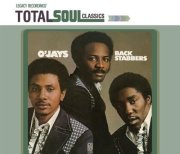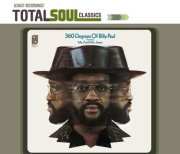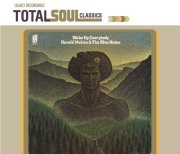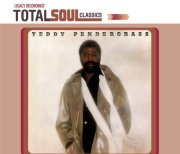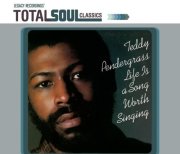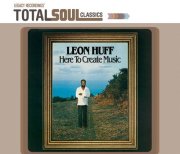 With the temperature dropping, it's time to find someone to keep you warm. Find your hookups with our online dating guide!
With the temperature dropping, it's time to find someone to keep you warm. Find your hookups with our online dating guide!
Total Soul Classics reissues
- Soul
- 2008
- Buy the CD
Reviewed by Michael Fortes
()
Sony BMG’s Legacy division, which previously only had the rights to PIR’s pre-1976 catalog, recently acquired the rights to the whole kit and caboodle and have set out to re-introduce some of the label’s better-known classics and resurrect some buried treasure in the Total Soul Classics reissue series. While the packaging design is a bit of a letdown (especially in light of PIR’s recent box set triumph), with totally unnecessary borders around the cover art that look more appropriate for some sort of utilitarian software as opposed to a CD filled with funky soul grooves and quiet storm classics, the music is hard to argue with. The six albums chosen to kick off the series are all prime examples of mainstream 1970s Philly soul.
Back Stabbers
- Soul
- 1972
- Buy the CD
This is the album that made stars out of the O’Jays, and deservedly so. Eddie Levert, Walter Williams and William Powell sang the hell out of these ten tunes of varying shades and colors, and a couple of monster hits emerged from the bunch in the title track and “Love Train.” But the true strength of Back Stabbers is in the quality of everything else on the album: “When the World Is at Peace” resurrects the horn-driven funk-rock that Sly Stone had abandoned just a few years earlier; “Who Am I” mixes beautiful doo-wop style harmonies with jazzy guitar licks, dreamy percussion, and haunting strings; even the lower-charting hits “Time to Get Down” and “992 Arguments,” which basically follows the same formula as “Love Train” and “Back Stabbers,” respectively, play well all these years later. No bonus tracks were added to this reissue (the second CD edition of Back Stabbers to appear in the US since it debuted on the format in ‘96), but it doesn’t matter – as one of the strongest album’s in the PIR catalog, it stands well enough on its own.
360 Degrees of Billy Paul
- Soul
- 1972
- Buy the CD
Billy Paul will always be known as the dude who the original (and best) version of “Me and Mrs. Jones,” which remains his only major pop hit (a number one at that). But 360 Degrees of Billy Paul was filled with plenty of other productions with hit potential, mainly due to the fact that three of the songs were covers of then-recent pop hits: Carole King’s “It’s Too Late,” Al Green’s “Let’s Stay Together,” and Elton John’s “Your Song.” Not unlike the way artists like Donny Hathaway and the Isley Brothers approached their covers back then, these tunes were given fresh arrangements (“Let’s Stay Together” is transformed into a stately ballad; “Your Song” gets an injection of energetic drumming), and Billy batted them out of the park with his thick, creamy tenor and effortless, jazzy ad libs. But this all comes after a couple of socially conscious Gamble-Huff originals, “Black Baby” and “I’m Just a Prisoner,” which find Paul in trippier musical territory; later on, the sermonizing comes down to earth with the funky, conga-laden “Am I Black Enough for You?” that perfectly captured the early ‘70s zeitgeist. The only real disappointment of this reissue is what the inclusion of the bonus live version of “Me and Mrs. Jones” seems to indicate – that the album on which it originally appeared, 1974’s Live in Europe, wasn’t deemed significant enough to warrant its own full reissue.
the Blue Notes:
Wake Up Everybody
- Soul
- 1975
- Buy the CD
It’s only seven songs long (and eight in this CD edition, which duplicates the program of the 2003 reissue), but none of it is filler. Lead singer Teddy Pendergrass turned what could have been just another in a long line of “change the world” declarations into a full-on sermon – and a top 20 hit single. And just a year after the album’s release, Motown cribbed the disco workout “Don’t Leave Me This Way” for Thelma Houston and took it to number one, more or less sticking to Norman Harris’ original arrangement for the Blue Notes, and begging the question: why on Earth didn’t the Blue Notes release it as a single themselves? While these up-tempo numbers were ultimately what defined the album, the quiet storm duet with Sharon Paige, “You Know How to Make Me Feel So Good,” and Sharon’s solo turn on “I’m Searching for a Love,” were the cherry on top. Teddy’s star continued to rise when he left the Blue Notes to ensure he always had top billing, but Wake Up Everybody remains his crowning achievement.
Teddy Pendergrass
- Soul
- 1977
- Buy the CD
There’s really no one stand-out on Teddy Pendergrass’ solo debut, but it did the job of introducing him to the world as a solo artist and maintaining his presence on the R&B charts with the almost sadistically buoyant dance track “I Don’t Love You Anymore” and a bread-and-butter song of regret, “The Whole Town’s Laughing at Me.” In retrospect, the album is notable in that it didn’t flaunt TP’s soon-to-be notorious sexual prowess in song like he would on subsequent records – he was still content singing an intelligent bit of advice like “You Can’t Hide from Yourself” or a sensitive ballad like “And If I Had.” He was playing it safe here, following the tried and true Gamble-Huff formula of mixing classy love songs with socially conscious messages, and injecting some danceable funk into the mix, and it bought him some time to ponder his next move.
Life Is a Song Worth Singing
- Soul
- 1978
- Buy the CD
“Come here, woman!” Now this is the confident, cocksure TP we all know and love, on his own and fully arrived. “Close the Door” was his first and biggest solo crossover hit, a top 30 pop and #1 R&B single, that established Teddy as a major musical seducer. Of course, this success inspired Pendergrass and his PIR team to try capturing lightning in a bottle again and again (see “Come Go with Me” and “Turn Off the Light” from ’79, for example), but the original is still the best. Naturally, this and the other slow tunes (including the still-spun classic album track “When Somebody Loves You Back”) were saved for the second half of the album, a chill-out from funky dance floor fodder like “Only You” and the title track. The music still holds up thirty years later, but beware of this set’s liner notes – they claim that a live version of “Life Is a Song Worth Singing” and an alternate mix of “Close the Door” are included, but neither are here. What’s up with that?
Here to Create Music
- Soul
- 1980
- Buy the CD
Where has this album been for the past 28 years? Leon Huff spent most of his time writing and producing hits for others, and as it turned out, he couldn’t exactly do the same favor for himself. Artistically, however, Here to Create Music is a rousing success. From the opening synth drums of “Your Body Won’t Move, If You Can’t Feel the Groove,” it’s clear that this isn’t any ordinary Philly International album. The minimalist rhythm arrangement foreshadowed Marvin Gaye’s Midnight Love by a couple of years, while echoing Quincy Jones’ knack for funky vamps colored by an assortment of singers that Q had perfected back in ’74 with his Body Heat album. And being that Huff was one of the head honchos at PIR, he had access to whoever he wanted to use – the O’Jays, Teddy Pendergrass and the Jones Girls are all here, and he even got Stevie Wonder to lay down some harmonica on “No Greater Love” (whose melody simultaneously references “My Funny Valentine” and predicts Stevie’s own “From the Bottom of My Heart”). His joyous, shuffling piano boogie “I Ain’t Jivin’, I’m Jammin’” also takes the liberty of copping a lick from the single “Family Reunion,” which Huff wrote for the O’Jays. As far as vanity albums without pop hooks go, Here to Create Music is not only one of the more enjoyable ones out there, it’s a underappreciated gem in PIR’s catalog, sweetened with two bonus tracks.
You can follow us on Twitter and Facebook for content updates. Also, sign up for our email list for weekly updates and check us out on Google+ as well.











